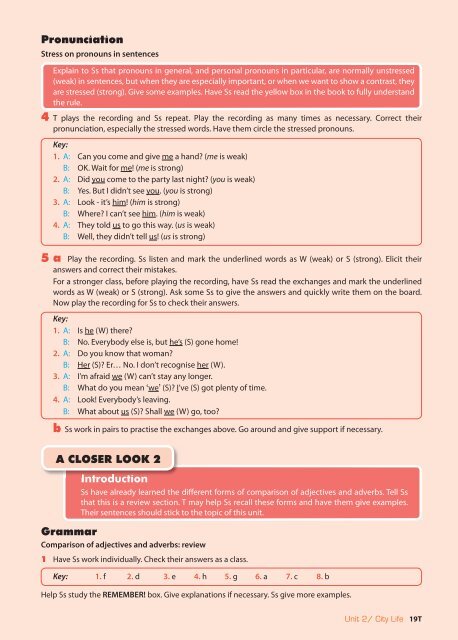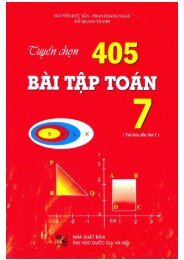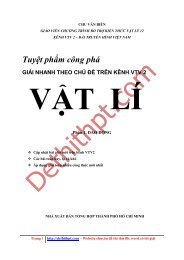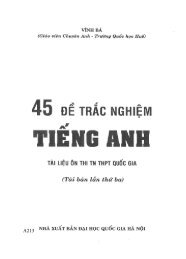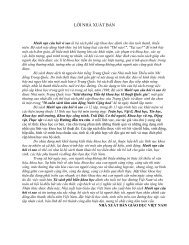- Page 2 and 3: 2 Contents Page INTRODUCTION ......
- Page 4 and 5: A closer Look 1 presents and practi
- Page 6 and 7: Before listening, teachers should m
- Page 8 and 9: BOOK Map Reading Speaking Listening
- Page 10 and 11: Unit 1 LOCAL ENVIRONMENT GETTING ST
- Page 12 and 13: a Can you find a word/phrase that m
- Page 14 and 15: A CLOSER LOOK 1 Vocabulary 1 Write
- Page 16 and 17: Pronunciation Stress on content wor
- Page 18 and 19: 2 Make a complex sentence from each
- Page 20 and 21: COMMUNICATION Extra vocabulary team
- Page 22 and 23: SKILLS 1 Reading 1 Work in pairs. O
- Page 24 and 25: SKILLS 2 Listening 4Teen radio is a
- Page 26 and 27: LOOKING BACK Vocabulary 1 Write som
- Page 28 and 29: Communication 6 Work in groups. One
- Page 30 and 31: Unit GETTING STARTED 1 Listen and r
- Page 32 and 33: a Complete the sentences with infor
- Page 34 and 35: A CLOSER LOOK 1 Vocabulary Adjectiv
- Page 38 and 39: 2 Complete the text with the most s
- Page 40 and 41: COMMUNICATION City life 1a Which of
- Page 42 and 43: SKILLS 1 Reading 1 Work in pairs. W
- Page 44 and 45: SKILLS 2 Listening 1 Does your city
- Page 46 and 47: LOOKING BACK Vocabulary 1 Complete
- Page 48 and 49: Communication 6 Work in two teams.
- Page 50 and 51: Unit 3 TEEN STRESS AND PRESSURE GET
- Page 52 and 53: a Find the OPPOSITE of the followin
- Page 54 and 55: A CLOSER LOOK 1 Vocabulary 1 Comple
- Page 56 and 57: REMEMBER! Normally the verb be is u
- Page 58 and 59: 3 Rewrite the sentences using quest
- Page 60 and 61: COMMUNICATION Life skills for teens
- Page 62 and 63: SKILLS 1 Reading 1 a Do you know wh
- Page 64 and 65: SKILLS 2 Listening 1a Listen to an
- Page 66 and 67: LOOKING BACK 1 Put yourself in thes
- Page 68 and 69: Communication 6 Work in pairs. Look
- Page 70 and 71: REVIEW 1 (UNITS 1 - 2 - 3) LANGUAGE
- Page 72 and 73: Grammar 5 Complete each sentence wi
- Page 74 and 75: SKILLS Reading 1 Read the two lette
- Page 76 and 77: Speaking 2 Talk in groups. Prepare
- Page 78 and 79: Unit GETTING STARTED Preserving the
- Page 80 and 81: a Read the conversation again and a
- Page 82 and 83: A CLOSER LOOK 1 Vocabulary 1 Match
- Page 84 and 85: Pronunciation Stress on auxiliary v
- Page 86 and 87:
Wishes for the present 3 Read the c
- Page 88 and 89:
COMMUNICATION downtown remote igloo
- Page 90 and 91:
SKILLS 1 Reading 1 Think. 1. How di
- Page 92 and 93:
SKILLS 2 Listening Writing 3 Make a
- Page 94 and 95:
LOOKING BACK Vocabulary 1 Choose th
- Page 96 and 97:
Communication 6 Rearrange the sente
- Page 98 and 99:
Unit GETTING STARTED A trip to Hue
- Page 100 and 101:
a Read the conversation again and f
- Page 102 and 103:
A CLOSER LOOK 1 Vocabulary 1 Write
- Page 104 and 105:
REMEMBER! Short words like articles
- Page 106 and 107:
3 Here are some things we hear abou
- Page 108 and 109:
COMMUNICATION Ann: Second sentence:
- Page 110 and 111:
SKILLS 1 Reading 1 Read an article
- Page 112 and 113:
SKILLS 2 Listening 1 Listen to what
- Page 114 and 115:
LOOKING BACK Vocabulary 1 Match adj
- Page 116 and 117:
7 Choose A-F to complete the follow
- Page 118 and 119:
Unit 6 GETTING STARTED Our school i
- Page 120 and 121:
a Put a word/phrase from the box un
- Page 122 and 123:
A CLOSER LOOK 1 Vocabulary 1 Put on
- Page 124 and 125:
5 Write each sentence in the box ne
- Page 126 and 127:
Adjective + to-infinitive/Adjective
- Page 128 and 129:
COMMUNICATION Viet Nam: then and no
- Page 130 and 131:
SKILLS 1 Reading 1 Work in pairs to
- Page 132 and 133:
SKILLS 2 Listening 1 Describe what
- Page 134 and 135:
LOOKING BACK Vocabulary 1 Complete
- Page 136 and 137:
Communication 6 Role-play. Intervie
- Page 138 and 139:
REVIEW 2 (UNITS 4 - 5 - 6) LANGUAGE
- Page 140 and 141:
Grammar 4 Choose the correct answer
- Page 142 and 143:
SKILLS Reading 1 Read the text and
- Page 144 and 145:
Speaking 2 These are some ideas tak
- Page 146 and 147:
GLOSSARY Abbreviations adj : adject
- Page 148:
Chịu trách nhiệm xuất bản
- Page 151 and 152:
IntRoDUCtIon tIẾng AnH 9 is the f
- Page 153 and 154:
The Project helps students to impro
- Page 155 and 156:
7. teAcHIng grAmmAr Teaching gramma
- Page 157 and 158:
Writing Language Focus Communicatio
- Page 159 and 160:
THIS UNIT INCLUDES: VOCABULARY Diff
- Page 161 and 162:
a Have Ss work independently to fin
- Page 163 and 164:
A CLOSER LOOK 1 Vocabulary Ask Ss t
- Page 165 and 166:
Have Ss complete the instructions i
- Page 167 and 168:
A CLOSER LOOK 2 Grammar Quantifiers
- Page 169 and 170:
Modal verbs in conditional sentence
- Page 171 and 172:
COMMUNICATION Tell Ss that in this
- Page 173 and 174:
SKILLS 1 Reading 1 Have Ss work in
- Page 175 and 176:
SKILLS 2 Listening 1 Have Ss do thi
- Page 177 and 178:
LOOKING BACK Encourage Ss not to re
- Page 179 and 180:
Communication 6 Have Ss rearrange t
- Page 181 and 182:
THIS UNIT INCLUDES: VOCABULARY Tour
- Page 183 and 184:
a Play the recording twice or more
- Page 185 and 186:
A CLOSER LOOK 1 Vocabulary Introduc
- Page 187 and 188:
Pronunciation Tones in asking for i
- Page 189 and 190:
1 T may have to give Ss some inform
- Page 191 and 192:
COMMUNICATION Introduction This sec
- Page 193 and 194:
2 Have Ss read the facts about the
- Page 195 and 196:
SKILLS 1 Reading 1 a Ss work in gro
- Page 197 and 198:
SKILLS 2 Listening 1 Let Ss work in
- Page 199 and 200:
LOOKING BACK T may give Ss a few mi
- Page 201 and 202:
Communication 6 a Have Ss read the
- Page 203 and 204:
THIS UNIT INCLUDES: VOCABULARY Lang
- Page 205 and 206:
a Tell Ss to refer to the conversat
- Page 207 and 208:
A CLOSER LOOK 1 Vocabulary 1 Ss wor
- Page 209 and 210:
Pronunciation Tones in new and know
- Page 211 and 212:
A CLOSER LOOK 2 Grammar Conditional
- Page 213 and 214:
Ask Ss to study the rules in the gr
- Page 215 and 216:
COMMUNICATION Introduction Before S
- Page 217 and 218:
SKILLS 1 Reading Introduction Befor
- Page 219 and 220:
SKILLS 2 Listening 1 Ask Ss to read
- Page 221 and 222:
LOOKING BACK This is the review sec
- Page 223 and 224:
Communication 6 First, ask Ss to do
- Page 225 and 226:
Introduction The aim of this unit i
- Page 227 and 228:
Grammar 4 Have Ss read the sentence
- Page 229 and 230:
SKILLS Reading 1 a Have Ss read the
- Page 231 and 232:
Listening 3 Have Ss read the notes
- Page 233 and 234:
THIS UNIT INCLUDES: VOCABULARY Astr
- Page 235 and 236:
A CLOSER LOOK 1 a Now tell Ss to lo
- Page 237 and 238:
A CLOSER LOOK 1 Vocabulary 1 Have S
- Page 239 and 240:
Pronunciation Continuing or finishi
- Page 241 and 242:
1 Remind Ss of how to use the past
- Page 243 and 244:
4 Have Ss work individually to comp
- Page 245 and 246:
2 Have Ss work individually and the
- Page 247 and 248:
SKILLS 1 Reading 1 Have Ss work in
- Page 249 and 250:
SKILLS 2 Listening 1 Draw Ss’ att
- Page 251 and 252:
LOOKING BACK Encourage Ss to comple
- Page 253 and 254:
Communication 5 Ask Ss to follow th
- Page 255 and 256:
THIS UNIT INCLUDES: VOCABULARY The
- Page 257 and 258:
a Ss work independently. Encourage
- Page 259 and 260:
A CLOSER LOOK 1 Vocabulary 1 Ask Ss
- Page 261 and 262:
Pronunciation Agreeing and disagree
- Page 263 and 264:
Non-defining relative clauses 3 Wor
- Page 265 and 266:
COMMUNICATION 1 a Start this sessio
- Page 267 and 268:
2 Ask Ss to work in groups of three
- Page 269 and 270:
Have Ss read the passage again and
- Page 271 and 272:
SKILLS 2 Listening 1 Ask Ss to look
- Page 273 and 274:
LOOKING BACK Encourage Ss to comple
- Page 275 and 276:
Communication 5 Ss work in pairs to
- Page 277 and 278:
THIS UNIT INCLUDES: VOCABULARY Jobs
- Page 279 and 280:
a Ss work in pairs to label the pic
- Page 281 and 282:
A CLOSER LOOK 1 Introduction Start
- Page 283 and 284:
Pronunciation High tones Have Ss si
- Page 285 and 286:
A CLOSER LOOK 2 Grammar Despite/In
- Page 287 and 288:
COMMUNICATION 2&3 Have Ss work indi
- Page 289 and 290:
COMMUNICATION Before Ss open their
- Page 291 and 292:
SKILLS 1 Reading 1 Ask Ss to work i
- Page 293 and 294:
SKILLS 2 Introduction Ask Ss to say
- Page 295 and 296:
LOOKING BACK Encourage Ss not to re
- Page 297 and 298:
Communication 6 Have Ss work in pai
- Page 299 and 300:
Introduction The aim of this unit i
- Page 301 and 302:
4 Check if Ss remember the meaning
- Page 303 and 304:
SKILLS Reading 1 a Have Ss work ind
- Page 305 and 306:
Speaking 2 This is an open speaking
- Page 307 and 308:
pick up (a language) (v) /pɪk ʌp/


